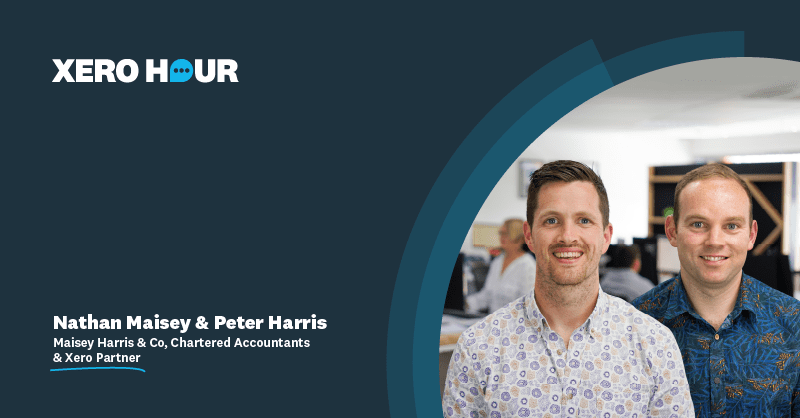
I’ve been an accountant most of my adult life and have seen so many business owners, who love what they do, but battle with their financials to stay afloat. In fact, Xero’s Small Business Insights (XSBI) show that on average, Kiwi small businesses are cash flow negative 50% of the time. Additionally, the recently released Xero Small Business Insights special report: Pandemic Insights: Small Business Experience shows that on average small business revenue was down 40% in April. It’s since increased but there is no denying this year has been particularly tough for businesses.
A support network starting with an advisor or business coach can make a huge difference. And this is why I’m so passionate about connecting advisors with small businesses all around the country.
Last week during Xero Hour #XeroOnAir, I had the privilege of chatting with Nathan Maisey and Peter Harris. Both Nathan and Peter are directors of Maisey Harris & Co (MHCO), the accounting firm that won Xero’s People’s Choice Award in 2019. I also spoke with two of their customers, Amy Attwood from Baby on the Move and Regan McFall from Fuel Storage. The conversation was very insightful as we discussed what makes a good advisor as well as what you should be looking for in a good advisor.
Defining your why and forging solid relationships
I regularly talk to accountants about defining their purpose, yet I come across many accountants and bookkeepers who cannot clearly articulate it, other than to say we want to “help our clients”.
MHCO define their purpose as ‘pedal to the metal’ and to partner with clients to help them achieve success, whatever that looks like.
‘Partnering’ is easily observed when their clients, Amy and Regan talked about the importance of relationships, positivity, accessibility and regular two way communication. They said they feel valued and are regularly encouraged to take steps outside of their comfort zone to improve the success of their business.
A few of their comments stuck with me:
“I have always felt valued as a business owner. Even as a young woman in business, I never felt like I was not valued.”
“I had big goals for the business and Pete was the only person who really stood by those goals. For me that was huge, knowing there was someone backing my goals and what I wanted to achieve. Someone that I could celebrate the successes with.”
“Relatability between myself and Peter – we’re similar ages. Pete makes sure I understand everything he’s saying, I can always ask questions and never feel dumb asking questions
“It’s personal. With an accountant I think it has to be personal.”
The Maisey Harris & Co experience
When I asked Nathan and Peter what’s important in an advisor, they challenged the word ‘advisor’ and replied “We call ourselves ‘business developers’. We coach clients and are available to bounce ideas off rather than have all the answers”.
A big part of it for both Nathan and Peter is the relationships they build with their clients. Empathy plays a key role so they can understand where clients are coming from – whether it be good or bad – and they both agreed on the importance of being present and available for your clients.
It’s not a one-way street though, they also hold their clients accountable for what they say they are going to do in order to help them achieve their goals. Co-creation of business plans and ongoing dialogue about these are key to support progress toward these goals.
And finally, Peter and Nathan noted that while a big part of their business is compliance based, it is just as important to them to be able to put the compliance on autopilot so they could spend more time adding value to clients and delivering business development services.
Top five traits of a good advisor
We covered a lot of ground during the hour and the discussion supported what I’ve always considered are the top five traits of a good advisor or business coach.
- Compliant: A good advisor will keep you compliant. They’ll have strong financial expertise, good ethics, and will keep you abreast of upcoming tax payments and financial obligations.
- Up-to-date: Your figures are up-to-date daily (real-time data) and you understand where you’re at. No more flying blind – everything is visible to you via online technology and connected systems. There’s also no need for an accountant to re-enter data because everyone is working on the same platform and ideally you are using a data capture tool like Hubdoc.
- Proactive: You have a good relationship and they proactively reach out to you regularly, without waiting for your yearly call.
- Forward-looking: They offer forward-looking assistance with budgets, forecasts, cash flow and business planning. They also provide support as you plan ahead or work together on new business ideas.
- Listen: They have an empathetic ear and can delve deeper to understand your motivators, goals and where you want to take your business.
In summary, if you’re looking for an advisor it’s important to find one where you can build a genuine relationship, interact on a regular basis and ensure your values are aligned. There needs to be a team mentality and if you’re constantly not seeing value, or leaving meetings in a bad mood – it’s time to reevaluate.
It’s also important to ask around. Don’t just opt for the cheapest option but rather, ask successful business owners what value their accountant adds to their business, and consider the fees an investment in your business, rather than a cost.
What do you look for in an advisor? I’d love to hear in the comments below.
Share this article
[addtoany]
